It’s a pretty well known fact in the entertainment world that
legendary filmmaker Woody Allen hates movie promotion. He almost
never does publicity junkets for his films, which is why his last
minute decision to participate in a press conference to promote his
latest film – the comedy Whatever Works – was such huge news
and recently drew dozens of media outlets to a
conference room at New York’s famous Regency Hotel.
The most pleasant surprise of the whole thing was that the
notoriously shy writer/director not only showed up but took the
lead. His film’s stars enthusiastically answered their questions,
but mostly sat back and let Allen speak about his
career and his film.
Whatever Works
is an important film for Allen in a few ways. The movie was filmed
in Allen’s hometown of New York, his first time in several years
after a few films made in Europe. Following a couple of his most
respected dramas (Match Point and Vicki Cristina
Barcelona), the former stand-up is returning to his lighter
comic roots. He is also working with a very buzz-worthy cast – but
then again Woody Allen has never had trouble luring top-flight
acting talent.
Three of those cast members accompanied Allen at the press
conference. The film’s star is comedian-turned TV star Larry David,
who co-created the sitcom Seinfeld and is about to do his
seventh season on HBO’s hit comedy Curb Your Enthusiasm.
Also there were respected young actress Evan Rachel Wood (Once &
Again, The Wrestler) and acclaimed
character actress Patricia Clarkson (The Station Agent, Good
Night & Good Luck) who was also in Allen’s last film, Vicki
Cristina Barcelona.
This is your first time working with Woody Allen, a living
legend, I believe. What for you was the
biggest surprise working with him?
Larry David: Well, no. It’s not my first time.
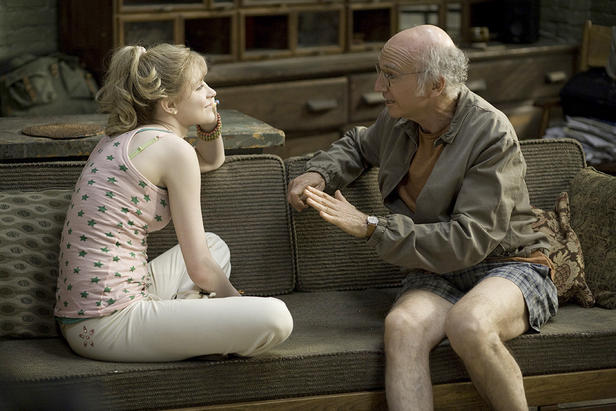 It
isn’t? What was?
It
isn’t? What was?
Larry David: I had two very small parts in Radio Days
and the other was New York Stories. Very, very small.
Okay, I was going to ask you if you ever felt that you were
Woody’s stand in, if you ever had to resist the urge to play Woody
with the lines and the rhythm.
Larry David: It’s funny; we were just talking about that.
But I never considered for a second that I would be playing him. I
know it’s the part that would normally see him play, but I never
considered that I would play him, nor would he want me to play him,
and it just wasn’t an issue at all. There was only one moment in the
movie, I remember, I was having trouble with a line and I said
“Come, how do you want me to do it? Just do it and I’ll do it like
you.” And so he went “the Western WORLD” (everyone laughs).
And so I did that the next take, but he didn’t
use that line.
Evan Rachel Wood: It’s
burned in my memory.
Woody Allen: I have to interject this, that is not a part
that I could have played even I was younger, I could not have played
this part, because… I had originally conceived this thing many years
ago for Zero Mostel… and Larry is able to do this kind of sardonic,
sarcastic, vitriolic humor and get away with it because there’s
something obviously built into him, that audiences like. Groucho
Marx had this, they were never offended by Groucho. They were
offended if he didn’t insult them, he told me once. Larry has this
thing where he can get away with that. If I was to do that I
wouldn’t be as graceful at it and you would think that I was nasty.
If I was insulting people and proclaiming my own genius and saying
that people were cretins, you would not like me. Certain people can
get away with it and he’s one that can. Not something that I would
do, because when Zero died, I never thought for one minute of doing
the part myself, “Oh, well I’ve got a good script here, and why
can’t I do it. I can handle this.” I never thought that. I put it in
the drawer and were it not for an imminent possible actors’ strike I
never would have taken it out of the drawer even to look at. I was
trying to think: who could do this? It never would have occurred to
me that I could do it, and then Juliet Taylor, my casting director,
thought that Larry could do it. I agreed completely that it would be
like mother’s milk to him. Did you want to speak?
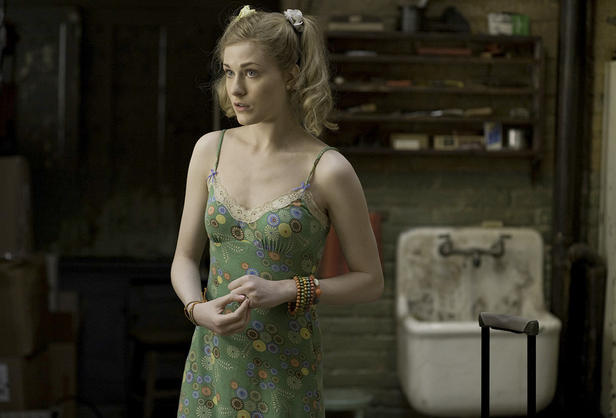 Evan
Rachel Wood: No.
I mean, I can’t really say that I was surprised by anything because
I don’t really like to have any preconceived notions. I just like to
experience on my own, no matter what. But, I was just amazed. I got
a whole new respect for comedians in general. I mean, I knew it was
going to be difficult and a challenge, but it was like running a
marathon every day. It was just whole new territory for me and I’m
just glad that he had the faith in me to offer me the part without
even seeing an audition.
Evan
Rachel Wood: No.
I mean, I can’t really say that I was surprised by anything because
I don’t really like to have any preconceived notions. I just like to
experience on my own, no matter what. But, I was just amazed. I got
a whole new respect for comedians in general. I mean, I knew it was
going to be difficult and a challenge, but it was like running a
marathon every day. It was just whole new territory for me and I’m
just glad that he had the faith in me to offer me the part without
even seeing an audition.
This is actually a question for Evan but also Patricia’s
character has a little bit of this. With Melodie can be played very
broad, you could go a million different ways with her and I wondered
what it was, was it in the script already to sort of rein her in or
was that your instincts or where did you feel you were going to far.
Any of you can answer this question.
Evan Rachel Wood: I
think that’s where Woody was great about giving me the freedom to go
as far as I wanted and me trusting him to tell me when to reel it
in. But funny enough… broad was actually the word that he told me
all the time.
Patricia Clarkson: I think the beautiful thing about Woody is
that, reasons I’ll never figure out, he has created trust in us.
It’s a beautiful freedom he gives you as an actor which, I think,
makes you a better actor. He gives you confidence to go large and
wide and trust that you will actually be employed again after you’ve
seen the film. So yes, I think he actually trusted that we could
really stretch it big and still remain truthful.
Mr. Allen do you have anything to say about that praise
that you just got?
Woody Allen: Well, you know, people have always asked me
over the years about performances in my movies. They think I’m being
facetious when I say this, but I’m not – I hire great people and
then I get out of their way. They were great before they met me.
They’re great in my movie. And they’re great in the movies after me.
You know, I just don’t want to mess them up and then tell them that
they’re free to go. If they’re doing something that I notice is
egregiously wrong for some reason – which rarely happens, it does
happen, but very rarely – so then I’ll say something to them. I’ll
say “You know, this needs to be more grim or this needs to be a
little louder or quieter” or something, but that’s it. If you read
the script, they understand it, they get it. That’s why they take
the job, and they do it. Afterwards you look great as a director,
but the truth is, if you hire the right people… You know, Evan I had
seen very briefly in some things and she was obviously… (to her)
and I’m not saying this because you’re here… she was great. I
thought “God, this girl is wonderful.” I didn’t know she could do a
southern accent. She said to me “Yes I could do one.” But she did
not want to do it and show me. I just assumed I’ve seen her in other
movies and she’s not going to take the job and make a fool of
herself. When she came to the set, the first time I heard the accent
she was doing was when we shot her. I never heard her in rehearsal.
There was no rehearsal. I never heard it in conversation or the
wardrobe test. She just came and did it. Ed Begley, Jr. didn’t even
know that he was supposed to be doing the southern accent. We were
on the set and he was surprised. I got panicky for a second. He said
“okay” and he made some kind of mental adjustment and he was just
great.
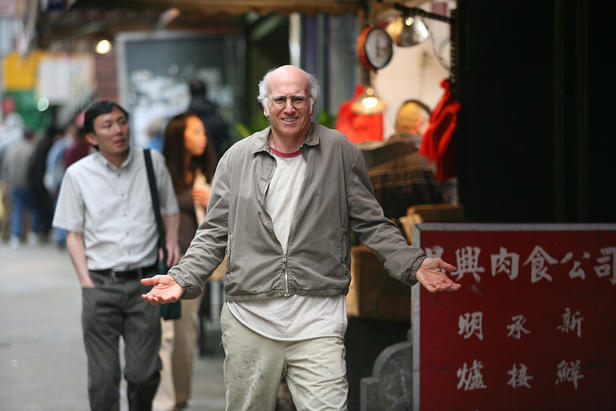 This
is for each of you, what do you do when you have panic attacks, if
you have them?
This
is for each of you, what do you do when you have panic attacks, if
you have them?
Larry David: I can’t really say in a G-rated press
conference.
Evan Rachel Wood:
What do I do? I don’t know.
Woody Allen: Did you ask a dirty question?
In your film one of the characters watches Fred Astaire
films to calm himself. What do you do to calm yourself?
Woody Allen: Oh. It’s perfectly a benign question. Yes, I
can speak for myself in this; I do exactly that kind of thing. You
know, you turn on something in television. With me, it would
probably be a ball game or something. Something that’s calming,
where there’s no sense of conflict. If I was to turn on a movie, I’d
be full of self-loathing and think “Oh God! I make these movies and
there’s so many great ones” and I couldn’t do that. But I could turn
on a ball game and be very placid.
Patricia Clarkson: Actually I’m a news
junkie so, even though there’s a lot of conflict, I do like it. It
calms me for some reason. I find it soothing. I love watching the
news. I watch it 24/7.
Evan Rachel Wood:
That’s funny. I actually do the same thing,
because it makes me laugh. I think if you watch the news long enough
it’s the funniest thing I’ve ever seen – because it just makes no
sense. They just have the most ridiculous stories and there’s the
weirdest stuff happening and it’ll calm me down because it’s so
ridiculous.
Larry David: I generally stay with the panic. I embrace the
panic. I know there’s no getting out of it. Even if I turned on a
ball game, it wouldn’t make a difference to me. I would still hear
that sick psychotic voice going on in my head and there’s nothing I
could do.
Woody Allen: It’s perfect casting.
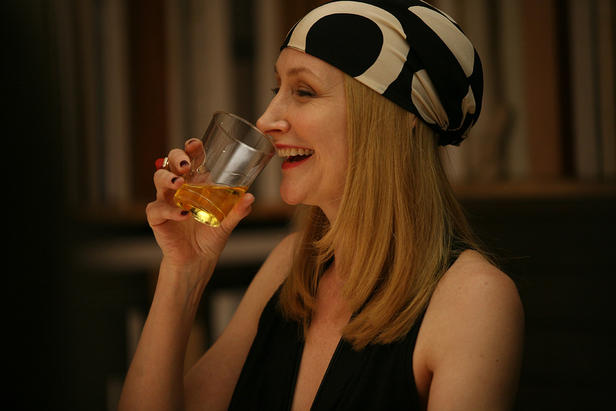 Patricia,
I loved your character, I thought she was wonderful. How did you
prepare for that? I loved the way you got even with your husband and
had two lovers.
Patricia,
I loved your character, I thought she was wonderful. How did you
prepare for that? I loved the way you got even with your husband and
had two lovers.
Patricia Clarkson: Two… yes! Thank you, Woody. And to be played
by Conleth Hill and Olek Krupa… I mean what delicious, beautiful
men. I was born and raised in New Orleans. I’m a southern girl
through and through. I had a similar trajectory. I was a nice
southern girl – from a far more progressive family than they are,
but I do know that lady well from being in the south a long time. I
just understood it in ways. You know, at nineteen I came to New York
to pursue my art and I arrived with very big hair that wouldn’t fit
through a door. Slowly it collapsed and slowly the clothing became
black. That’s what happened to me – albeit at nineteen, not at
middle age – but whatever works.
When Larry was cast, did you rewrite anything to take
advantage of Larry’s comedic style? And Larry, when you were doing a
scene, was there any time when you were like “I kind of sound like
Larry David from
Curb Your Enthusiasm. I kind of want to redo this like Boris.”
Did any of that voice come out?
Woody Allen: I didn’t rewrite anything for Larry. When I
took the script out of the drawer, I did have to rewrite the script,
because it had been laying there for a long time dormant. I had to
freshen it up and jazz it up and make it more contemporary. But I
never changed it for Larry. Larry just seemed to fit it like a
glove. As soon as Juliet Taylor said “Larry David” a light lit up
and it seemed, yes of course. Larry David.
And Larry about the Boris and
the Curb Your Enthusiasm question?
Larry David: That wasn’t your question! (Everyone
laughs) What was it?
Did you ever feel like you were doing a scene and you
thought “That sounded too much like my character on TV. I want to
redo that because that didn’t sound like Boris,” because you were so
used to doing that other character?
Larry David: No, when I was doing those lines it felt like
Boris. I tried to convince him at some point before we started
shooting that he should change the character occupation to a former
grandmaster. Yeah, I didn’t want to be a physicist because I thought
I wouldn’t be able to improvise because the character’s so much
smarter than I am.
Evan Rachel Wood:
But you can improvise a former grandmaster?
Larry David: I thought I could improvise a chess champion,
yeah.
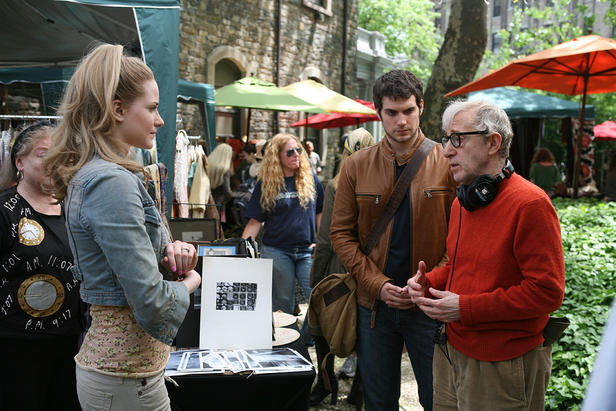 Woody,
given that the script was written in the seventies and the changing
times and evolution of your own, how much work did it take to bring
this script up to date?
Woody,
given that the script was written in the seventies and the changing
times and evolution of your own, how much work did it take to bring
this script up to date?
Woody Allen: It took work. The original story, what
intrigued me about it originally is that Zero is this big fat
blustery self-aggrandizing. You know Zero in real life was so
cultivated, he knew everything about art, literature, science and
music and he was always sharing this knowledge with you from a
justifiably superior position. I thought it was very funny to be
around him. I was around him when we made The Front and he
was always carrying on and lecturing. I thought it would be very
funny that he would be living with this runaway, this dumb little
runaway from the south. Then suddenly her mother shows up and she
hates everything about him and can’t stand him. Then her father
shows up. It seems that original material all remained the same, but
references and the concerns… the existential concerns remained the
same, those will never change ever. The character was mortally
afraid of dying and hypochondria about washing his hands. The social
and political things, many of them had to be changed and freshened
up to contemporary and social patois.
The tone of the humor is clearly pretty judgmental. It’s
misanthropic and particularly aimed at the people in the
hinterlands. In the last couple of weeks we’ve seen a couple of ugly
murders from the religious right wing (the press conference took
place the day after the shooting at the Washington Holocaust museum)
and I was wondering if you had any thoughts or reactions to that?
Woody Allen: I personally was against the murders. I never
think of it as misanthropic. Even though I know that sounds funny,
because that is the source of the humor, but it seemed to me that
it’s a realistic appraisal of life. Life is quite terrible out
there, as you can see by what goes on. This is fiction, and can be
read as misanthropic and can be interpreted that way. As I say, I
don’t think it is. I think it’s simply realistic, but the real world
is as horrible – or actually much more horrible – than the world
that Boris envisions. He has compassion and feels bad about this,
but the world out there is full of… you know, you can’t pick up the
paper in the morning without a carload of atrocities. Two young
women are thrown in prison in Korea. Some guy enters a Holocaust
museum and kills the guard. This is the average stuff we live on,
every morning. So in a sense, the movie is almost mild compared to
the ugly brutality that is just a part of your morning… you know,
cornflakes and breakfast.
This question is for Woody. You mentioned that the
existential concerns of the film then and now are the same, but
basically the social and political concerns have changed, could you
talk about that a little?
Woody Allen: When I wrote the film years ago, the political
climate was not vastly different, but the references were different.
As I said, the existential underlying anxiety of the film remains
the same, but the political situation has shifted. Since then we’ve
been through a number of presidents. Certainly a catastrophic eight
years and now entering into at least a period of some hope of some
human possibilities for the country. All of this had to be factored
in, in writing. And of course, the references are different. The
religious right made an enormous march forward since that time. They
existed at that point – there were those terrible television
ministries that were conning people out of their money – but the
right became politically powerful. We have made progressed and we
have elected our first African-American president. There were a
number of things that had to be referenced in this movie that were
not. The seeds of them were there, some of them – but they were not
vivid at that time.
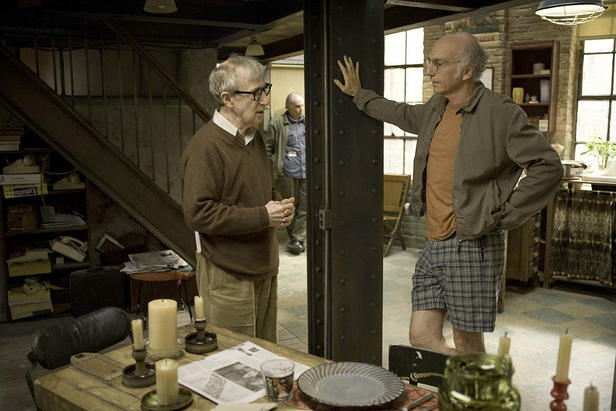 There
was a recent article about your humor and Larry’s humor as being
reflecting a certain era or style of Jewish humor. Do you think that
it does reflect that and do you think that style is, as that article
had said, passing and that a new generation is coming with a
different approach? Do you think that’s true? How do you feel about
that? And do you think you reflect a certain kind of Jewish humor,
or not?
There
was a recent article about your humor and Larry’s humor as being
reflecting a certain era or style of Jewish humor. Do you think that
it does reflect that and do you think that style is, as that article
had said, passing and that a new generation is coming with a
different approach? Do you think that’s true? How do you feel about
that? And do you think you reflect a certain kind of Jewish humor,
or not?
Larry David: I don’t know. I don’t quite agree with that, I
don’t think. Oviously comedic styles do change. I mean, comedy isn’t
the same now as it was in the 50’s or the 70’s, I suppose. It still
has to be funny, but that’s the bottom line. I guess it’s a little
grosser now to some degree. Really, you can watch movies now and I’m
a little shocked at what I’m hearing, but I suppose that’s the
biggest change.
Woody Allen: First of all, I’m not a big believer in this
sense of Jews having a monopoly on comedy. I believe they’ve made a
contribution, for sure, but Bob Hope was not Jewish. Buster Keaton
was not Jewish. W.C. Fields was not Jewish. Jonathan Winters was not
Jewish. I mean you could go on… Robin Williams… These people are not
Jewish and they’re hilariously funny. So much has been made of this
and I never think of it as an ethnic focus. I agree with Larry that…
he put it very simply but right on the nose… it’s a question on just
being funny. Some people are funny and some people are not funny.
Many people who are not funny can make a living at it, because you
don’t have to be great to make a living at it. Just like a doctor.
Doesn’t have to be great to make a living out of it, and a lawyer
doesn’t have to be… So same with comedians. In the end to really be
wonderful at it you’ve got to be funny. Every generation there are a
few people that are authentically funny. The cosmetics change. W.C.
Fields is totally different than Mort Sahl. Mort Sahl was great and
he was totally different than Jonathan Winters, who’s great. [Mike]
Nichols and [Elaine] May were completely different from Larry and
they’re all great, because they’re al authentically funny. The ones
that are not authentically funny, you know. Your body knows. You may
not be able to articulate it and you may laugh at them and get a
certain amount of enjoyment, but when you’re asleep at night and you
wake up at three in the morning and you’re alone in your bed – you
know who is really funny. That’s what it is. Some people are some
people aren’t. It has nothing to do with ethnicity.
 A
big deal has been made about the fact you’ve done your last four
movies in Europe and you’re going back to Europe for your next one.
Can you talk about the decision to go to Europe to do those movies?
A
big deal has been made about the fact you’ve done your last four
movies in Europe and you’re going back to Europe for your next one.
Can you talk about the decision to go to Europe to do those movies?
Woody Allen: That’s strictly a function of finance. It’s
very expensive to make movies in New York. I work on a very low
budget and I can’t afford to do it. I’d like to do it. I’d like to
make movies in New York because I live here and I love it. But
surprisingly New York and California, which is the film center of
United States, theoretically is too expensive. It just costs a
fortune of money. I was going to make my next film in New York and I
couldn’t afford to. It was millions of dollars short if I made it in
New York and then I thought maybe I’ll make it in San Francisco
because that’s also a very good city, but I couldn’t afford to make
it in San Francisco either because that was too expensive. So we
shifted it to London, made the cast British, just as I had done with
Match Point. I had written that for New York, the Hamptons
and Palm Beach. I had written it as an American story and I
anglicized it because to make it in New York was a fortune of money.
The same thing with the film I’m doing next, to make it in New York
is a lot of money. I can’t afford it. So I can afford to do it in
London. I would love to make more films in New York, because I love
the city and I love being here. It’s just a question of being able
to afford it. If I happen write a film that budgets within my
limited budget I would certainly make it here.
Do you have to change your sensibilities when you know
you’ve got to do it in a different country?
Woody Allen: The sensibilities the same certainly in a city
like London. I mean, that’s another version of New York. Barcelona
was a little bit different. I wasn’t as familiar with Barcelona, so
I had to write some of the characters speaking in Spanish and that
did have an influence on the content of the script. I mean in this
case fortuitously a good influence but it could have had a bad
influence just as easily. So my first instinct is to go to London,
because they speak English and it’s a city with restaurants and
bookstores and traffic. I can feel it there. But I’d just as soon
make it in New York if I could do it.
Whatever Works is really a redemptive about the magic of New York
and I just want to know what New York has done for everybody here.
What locations in particular had a kind of magic to film?
Woody Allen: I’ll let you guys answer that.
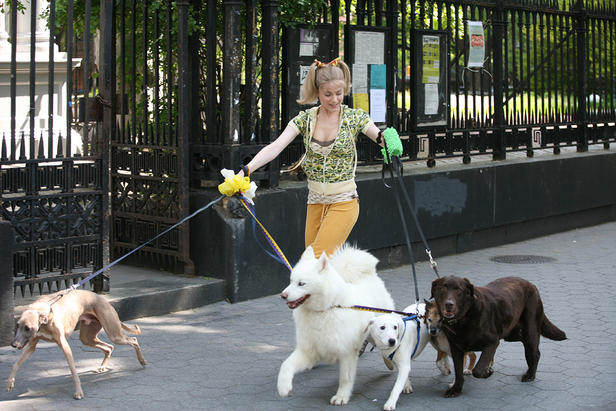 Evan
Rachel Wood:
I kind of did what Melodie did and I moved to
New York when I was eighteen – when I turned eighteen and I was
filming Across the Universe. I was filming on the streets of
New York for the first time and singing Beatles songs and it changed
my entire life. I don’t know what I would have done if hadn’t made
that movie. I spent a year here and I just felt like I knew who I
was finally. The city really does something to you. I have a
different experience every time I go there. I’m always finding new
places. I don’t know where we filmed that felt… I mean I want to say
Battery Park but that was a nightmare. It was terrible, but it was
still pretty cool. The wax museum was pretty fun. The magical way I
didn’t know who was real or who was fake.
Evan
Rachel Wood:
I kind of did what Melodie did and I moved to
New York when I was eighteen – when I turned eighteen and I was
filming Across the Universe. I was filming on the streets of
New York for the first time and singing Beatles songs and it changed
my entire life. I don’t know what I would have done if hadn’t made
that movie. I spent a year here and I just felt like I knew who I
was finally. The city really does something to you. I have a
different experience every time I go there. I’m always finding new
places. I don’t know where we filmed that felt… I mean I want to say
Battery Park but that was a nightmare. It was terrible, but it was
still pretty cool. The wax museum was pretty fun. The magical way I
didn’t know who was real or who was fake.
Why
was Battery Park a nightmare?
Evan Rachel Wood:
The noise and the rain, but that wasn’t Battery
Park’s fault.
There’s been a trend recently of films being turned into Broadway
musicals, for example Mel Brooks’
The Producers…
Patricia Clarkson: (sings a tune) What-ever-works!
(Everyone laughs) I can dance.
Billy Elliot won most of the Tonys this year. Have you ever
thought of transforming one of your films into a Broadway musical?
And if so, which one?
Woody Allen: Well I would have no interest in that myself.
None. Producers call all the time and they want to make Bullets
Over Broadway a musical and Purple Rose of Cairo into a
musical. They do propose these things. I don’t care – if they want
to and they make some deal they can, but I have no interest in it.
No interest in writing it, seeing it, knowing about it. It’s just
something that would not interest me at all. But some of them would
make good musicals in the right hands. The books of some of those
things would potentially be good musicals. The odds are of bringing
it off are hugely against it. The odds of doing a good musical even
if you have a book that’s viable to begin with, the odds are not in
your favor. So what would probably happen is they get the rights to
one of my movies and make it into a musical and it’d be a terrible
musical and everyone would be angry at me.
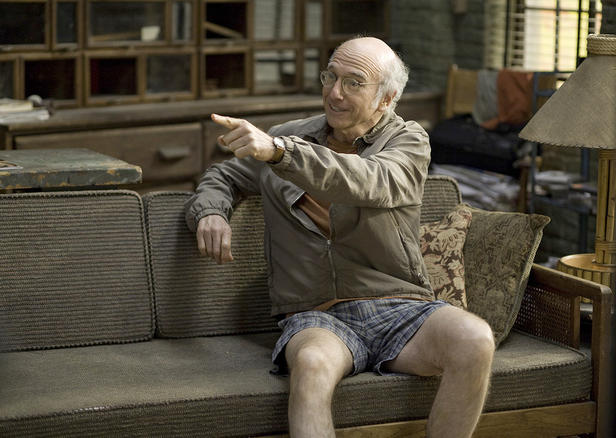 Larry,
how do you think
Curb Your Enthusiasm: The Musical would be...
Larry,
how do you think
Curb Your Enthusiasm: The Musical would be...
Larry David: Uhh, yeah, sure, right. (Everyone laughs)
Earlier you said that you give your actors the material and then you
stand back. So when one of your actors gets an Oscar, do you feel
rather aloof from those awards? Do you feel you didn’t contribute to
it?
Woody Allen: I don’t feel aloof from it. Aloof would mean
feeling above it and superior to it. No I don’t feel that. But I
don’t feel like they’re getting this Oscar because I brought out
something in them that nobody else could or wasn’t in them. They
basically get the Oscar because they’re good. I mean when Penelope
Cruz wins an Oscar or Dianne Wiest or Diane Keaton… it’s because
they’re great. I do feel a modicum of contribution in that I
supplied them with the role, with the role that they can spread
their wings and show themselves off. They’re not getting that Oscar
because I sat them in the room and drilled their character into them
or tricked them in different ways. You know, you read [Elia] Kazan’s
biography and take James Dean on the motorcycle and they somehow get
these performances.
Patricia Clarkson: Yeah Woody took us to Cajun Restaurants and
poured gumbo all over us and teased our hair.
Woody Allen: I mean I can’t do that. I don’t even talk to
them. I try not to talk to them as much as possible. They do what
they do and they’re usually very good at it. I don’t feel aloof, I
do feel that I made a contribution in giving them a part that they
could show themselves off in, but believe me, I don’t over direct
them. They’re getting those Oscars because they’re who they are;
Penelope Cruz was sensational in the Almadóvar film before my film.
Michael Caine was sensational… actually Michael Caine deserved the
Academy Award for Educating Rita – the film he did before my
film. He didn’t deserve [it] necessarily for my film. I think they
were paying off for not giving him one in that. He’s great. But I
don’t feel aloof from it, no.
Just
a follow up on the magic of New York question, I was wondering if
Larry David and Patricia could comment on some of your early New
York memories and experiences.
Larry David: Well, I grew up in Brooklyn and then I lived
in Hell’s Kitchen, from the time I got out of college until I moved
to LA in my early 40’s, so I remember very distinctly the smell of
urine as I left my front door. I remember having to take my shoe off
before I came in my apartment to kill the thousands of roaches that
were in my bathtub. I have very fond memories of it. Shall I go on?
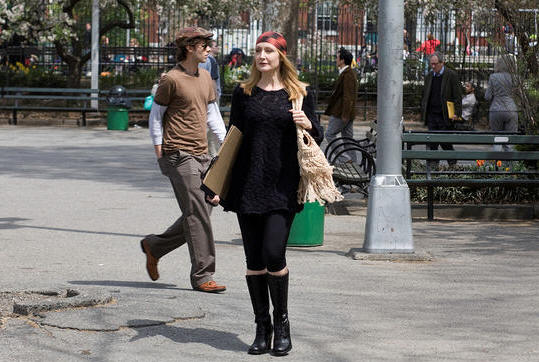 Patricia
Clarkson: The first placed I lived was YMCA, because at
Fordham University they didn’t have dorms then, so I was in the
YMCA. I was in the YMCA on 63rd. I remember on Friday nights there
were these nice, young boys around and I thought they just returned
from a YMCA camping trip. No…
Patricia
Clarkson: The first placed I lived was YMCA, because at
Fordham University they didn’t have dorms then, so I was in the
YMCA. I was in the YMCA on 63rd. I remember on Friday nights there
were these nice, young boys around and I thought they just returned
from a YMCA camping trip. No…
Evan Rachel Wood:
I thought it was fun to stay at the YMCA.
(Everyone laughs).
Patricia Clarkson: No, but, I’m a New Yorker now I guess. I love
the Village. I love the West Village. I love downtown. I’ve lived
there for a long time. It’s my favorite part of New York. I’m never
tired of it, ever, walking with my dog, ever.
Woody Allen: I remember fighting with people every day
because I couldn’t get change for a dollar to get on the bus. Nobody
wants to give you their change. My memories of New York are
unrealistic. The New York that I grew up loving was ironically
enough; the New York of Hollywood movies. Where people would live in
penthouses with white telephones and come home in five in the
morning with ermine draped over their shoulders. This was the New
York that I knew. I grew up in Brooklyn, not that far from Larry… I
never knew New York as it really existed. For that you have to speak
to Spike Lee or Martin Scorsese. I only knew New York the way it
appeared with popping champagne corks and people dressed in tuxedoes
and making very witty banter and elevators rising into the
apartments directly. That’s the New York that I have depicted in my
life and have tried to live in my life and it’s cost me a lot of
grief.
I’m
wondering how you as a director feel your approach to filmmaking has
changed from the time when you wrote this script to the time when
you’re now making it.
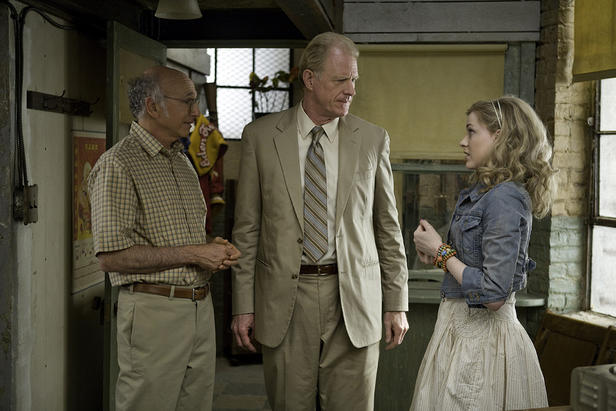 Woody
Allen: Well, marginally I’ve gotten better. But it’s
true; you can only get better marginally because it’s not an exact
science. Every time you make a movie - I’ve now made about forty
movies – every time it’s a new and different experience. You learn
very little from the past. Very, very little. So I’m a little bit
better than I was. When I first started I was very protective. I
made a lot of coverage and protected myself a lot. As I got more
confident, I was able to let actors improvise and do long takes. But
you know, it’s 10%, 5%. You learn the rest you just have or you
don’t have. I was lucky enough to be able to have enough to tell my
story. I’m not much better than I was. I’m better than I was when I
made Take the Money and Run, but not much better than I made
Annie Hall or around that era. I learned very little after
that. You know, the only thing that does change, I guess, to some
degree, is that you have some life experiences and you suffer some
amount and you incorporate that into your work. Not into the content
of your work, but in the sensibility of your work. It’s nothing that
you try and do; it just happens. If you’re lucky people buy tickets
to see it. If you’re not lucky they don’t like it. But that’s all,
there’s been a marginal increase in my technique and very little
else good.
Woody
Allen: Well, marginally I’ve gotten better. But it’s
true; you can only get better marginally because it’s not an exact
science. Every time you make a movie - I’ve now made about forty
movies – every time it’s a new and different experience. You learn
very little from the past. Very, very little. So I’m a little bit
better than I was. When I first started I was very protective. I
made a lot of coverage and protected myself a lot. As I got more
confident, I was able to let actors improvise and do long takes. But
you know, it’s 10%, 5%. You learn the rest you just have or you
don’t have. I was lucky enough to be able to have enough to tell my
story. I’m not much better than I was. I’m better than I was when I
made Take the Money and Run, but not much better than I made
Annie Hall or around that era. I learned very little after
that. You know, the only thing that does change, I guess, to some
degree, is that you have some life experiences and you suffer some
amount and you incorporate that into your work. Not into the content
of your work, but in the sensibility of your work. It’s nothing that
you try and do; it just happens. If you’re lucky people buy tickets
to see it. If you’re not lucky they don’t like it. But that’s all,
there’s been a marginal increase in my technique and very little
else good.
Larry
they first called you for the part. What was your first reaction?
Larry David: When I was offered the part? This is not a
good thing. This is not going to be a very good idea. I intimidated
and I don’t really like challenges. I don’t like to be out of my
comfort zone which is about a half an inch wide and I called Woody
and I said “I don’t know about this. I don’t know if I could do
this.”
You
played
The Producers part in Curb. Does that fit the anxiety
scene in Curb at the time when you said “I can’t do this. I
can’t do this.” Was that the kind of reaction like that in this
role?
Larry David: No. That was pretend.
What
did they say when you told them “I can’t do this”?
Larry David: He said that it would be a little bit of a
stretch for me but nothing that I couldn’t handle.
CLICK HERE TO SEE WHAT PATRICIA CLARKSON HAD TO SAY TO US IN 2005!
CLICK HERE TO SEE
WHAT EVAN RACHEL WOOD HAD TO SAY TO US IN
2005!
Email
us Let us know what you
think.